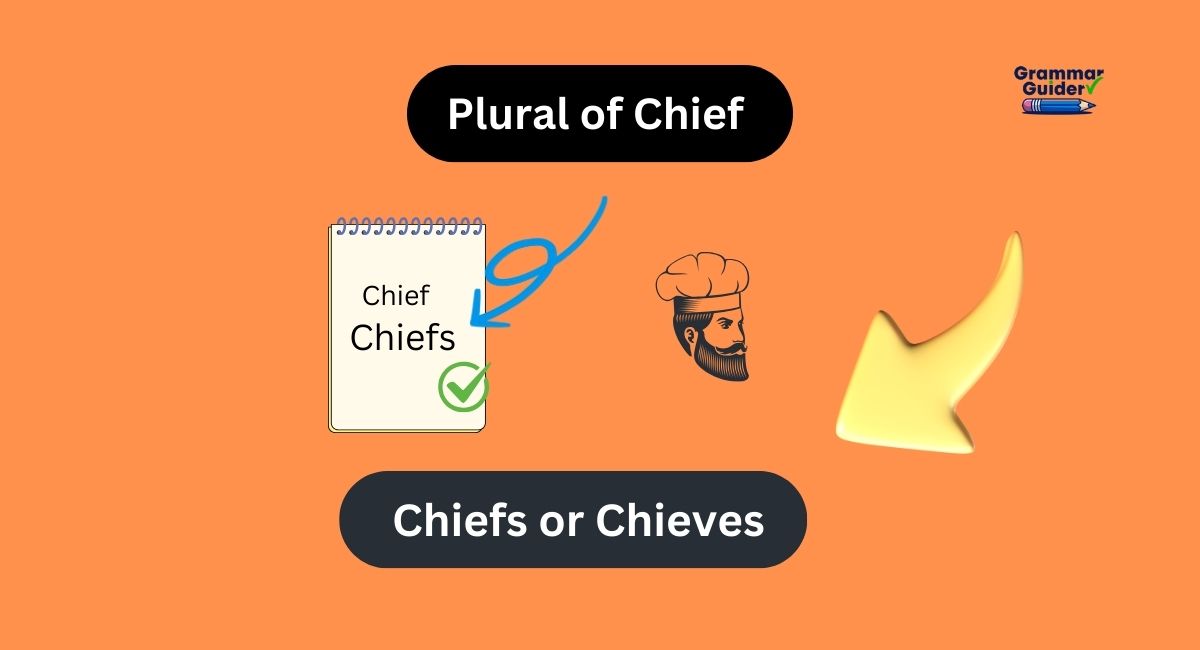The plural of chief is chiefs not chieves. To make most words ending in -f plural, we simply add an -s. This rule applies to chief because it follows the regular English pattern for pluralization.
A chief is a leader or person in charge. When talking about more than one we use chiefs. For example the chiefs of the school make important decisions. Using chieves is incorrect and doesn’t follow the usual rule in English grammar.
What does “Chief” Means?
The word “chief” means the leader or person in charge. A chief is someone who makes important decisions. For example a police chief leads the police force, and a chief executive officer runs a company. They guide and direct others.
A chief can also mean something that is the most important. For instance the chief reason for doing something is the main reason. The word chief comes from an old word meaning “head.” It is used in many situations to show leadership or importance.
Chief Singular and Plural
The singular form of a word refers to one thing or person. For example, chief is singular when talking about just one leader. The singular shows there is only one person or thing, like one chief in charge.
The plural form refers to more than one. To make chief plural, we add an s to make it chiefs. This means there are several leaders or more than one chief. Singular and plural help us know how many things or people we are talking about.
Why the Plural of “Chief” is “Chiefs” not “Chieves”?
The plural of chief is chiefs because English has rules for making words plural. When a word ends in an -f sound, like chief, we add -s to make it plural. This is a common rule in English.
The version chieves is not correct because it does not follow the usual pattern. Adding -s to chief makes it chiefs, which is the correct plural form. This rule helps keep English simple and clear when talking about more than one chief.
Singular and Plural Usage in Sentences
In a sentence we use chief when talking about one leader. For example, the chief gave a speech. When we talk about more than one leader we use chiefs, like “The chiefs met to discuss plans.”
Singular Usage
- The chief leads the team.
- Our chief made the decision.
- The chief helps everyone work together.
- The chief is very smart and kind.
- Every group has one chief.
Plural Usage
- The chiefs met to discuss ideas.
- Many chiefs attended the conference.
- The chiefs worked hard to solve problems.
- Different chiefs lead different departments.
- The chiefs are very experienced.
Origin of “Chief”
The word “chief” comes from the Old French word “chef,” meaning a leader or head. It has roots in the Latin word “caput,” which means “head.” Over time, it changed in Middle English to the word we use today.
The meaning of “chief” stayed the same throughout history. It always referred to someone in charge, like a leader or the most important person. The word still keeps this meaning, whether we use it in the singular or plural form.
Synonyms for the Word “Chief”
- Leader: A leader is someone who guides or directs others.
- Head: The head is the person in charge of a group or organization.
- Boss: The boss is the person who makes decisions and oversees work.
- Principal: The principal is the main person in charge at a school.
- Captain: A captain leads a team or a ship.
- Manager: A manager is someone who plans and controls work in a company or team.
What Makes “Chief” Different from Other Words That End in -f?
The word “chief” is different from many other words ending in -f. While some words change to -ves in the plural form, “chief” simply adds an -s to become “chiefs”. This follows a common English rule.
Unlike words like “knife” or “leaf”, which change to “knives” and “leaves”, “chief” does not follow this pattern. The plural form is “chiefs”, making it an exception. This rule helps keep the word simple and easy to use.
FAQ’s
What is the plural of “chief”?
The plural of “chief” is “chiefs”. You simply add an “s” to make it plural.
Why isn’t the plural of “chief” “chieves”?
The plural of “chief” follows the normal rule of adding “s” to words ending in “f,” not “ves.”
Can “chief” mean more than one leader?
Yes, “chiefs” can refer to many leaders or heads of a group such as military chiefs or police chiefs.
What is the origin of the word “chief”?
The word “chief” comes from Old French and means “leader” or “head.”
When do we use “chief” and “chiefs”?
Use “chief” when talking about one leader and “chiefs” when talking about more than one leader.
What are some synonyms for “chief”?
Some synonyms for “chief” are leader head boss and manager .
Conclusion
The plural of “chief” is “chiefs”, not “chieves”. This follows the regular pattern in English for words ending in -f, where the plural is formed by adding -s. It is important to remember that some words like “knife” and “leaf” change to “knives” and “leaves”. However, “chief” does not follow this rule and keeps it simple by becoming “chiefs” in the plural form.
Understanding how to form plurals is essential in English. By following the correct rules, such as changing “chief” to “chiefs” we can improve our writing and speaking. Knowing the right forms helps us use words more confidently.

Jacob Harrison is the seasoned writer behind Grammar Insights, with over nine years of experience in the field. Passionate about language, he shares practical tips and strategies to help readers enhance their grammar and writing skills. With a friendly approach, Jacob makes learning accessible and enjoyable for everyone.

